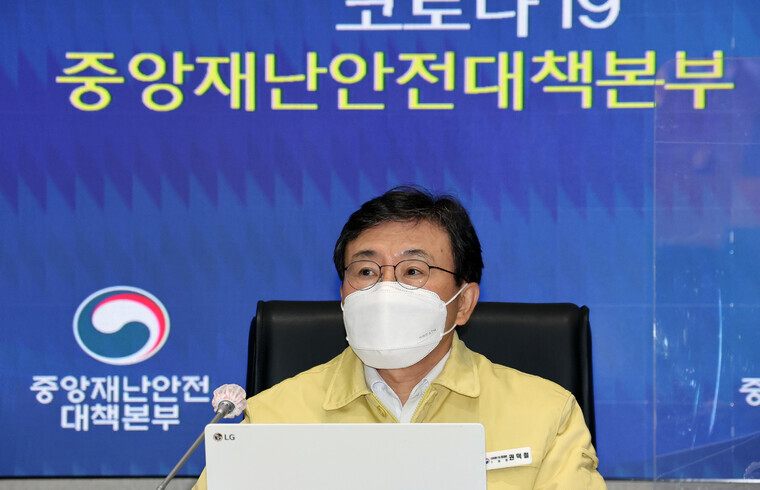hankyoreh
Links to other country sites 다른 나라 사이트 링크
S. Korea mulls priority PCR testing for COVID-vulnerable amid Omicron spread

Health authorities are considering adopting a COVID-19 testing strategy that prioritizes polymerase chain reaction (PCR) tests for older populations and those with underlying diseases to cope with the Omicron variant becoming the dominant form of the COVID-19 virus in Korea.
In addition to increasing the testing capacity from roughly 750,000 tests per day to 850,000, health authorities are also considering introducing supplementary rapid antigen tests (self-diagnosis kits) for those who do not belong to this priority group.
At a meeting of the Central Disaster and Safety Countermeasure Headquarters on Monday, Minister of Health and Welfare Kwon Deok-cheol said, “Around 10% of COVID-19 infections in South Korea are with the Omicron variant, but with its high transmissibility, experts predict that it will become the dominant variant within one to two months.”
“The Lunar New Year holiday, when many people will be traveling, will likely be a turning point [for Omicron’s spread],” Kwon added.
Last week in Korea, 12.5% of tests sequenced detected the Omicron variant.
The detection rate of the Omicron variant, which was 3.7% in the fourth week of December, rose to 8.8% in the final week of 2021 and exceeded 10% last week.
“This means that this ‘golden time’ for us to thoroughly prepare for the coming wave of Omicron is almost up,” Kwon added.
The government said that before Omicron becomes the dominant variant, the existing quarantine management system and medical response systems will be tailored to adequately deal with the variant.
In this regard, the government is reviewing testing strategies that prioritize PCR testing for those who are at risk of becoming seriously ill with COVID-19, such as those 60 and older and people with underlying conditions; those who have a higher risk of setting off cluster infections, such as workers at nursing and long-term care facilities; and those who are highly likely to contract the disease who have come into contact with a person confirmed to have COVID-19.
Lee Sang-won, head of epidemiological investigation and analysis at Korea’s Central Disease Control Headquarters, said, "Others will not be excluded from [taking] PCR tests, but will be given lower priority per this plan.”
“In addition, we are reviewing the possibility of treatment at a medical institution and rapid antigen tests for those who do not belong to these [prioritized] categories,” Lee added.
The KDCA said that it plans to increase its PCR testing capability in preparation for increased spread of the Omicron variant. Lee added, “Korea has the world’s highest [PCR] testing capability and quality.”
“Currently, about 750,000 cases can be processed per day, but there are plans to increase the number to 850,000 [total] in preparation for the Omicron variant,” Lee added.
Health authorities plan to announce a specific Omicron response plan within this week after consulting experts at a meeting concerning the return to normal scheduled for Wednesday.
By Jang Hyeon-eun, staff reporter
Please direct questions or comments to [english@hani.co.kr]

Editorial・opinion
![[Column] Season 2 of special prosecutor probe may be coming to Korea soon [Column] Season 2 of special prosecutor probe may be coming to Korea soon](https://flexible.img.hani.co.kr/flexible/normal/500/300/imgdb/original/2024/0426/3317141030699447.jpg) [Column] Season 2 of special prosecutor probe may be coming to Korea soon
[Column] Season 2 of special prosecutor probe may be coming to Korea soon![[Column] Park Geun-hye déjà vu in Yoon Suk-yeol [Column] Park Geun-hye déjà vu in Yoon Suk-yeol](https://flexible.img.hani.co.kr/flexible/normal/500/300/imgdb/original/2024/0424/651713945113788.jpg) [Column] Park Geun-hye déjà vu in Yoon Suk-yeol
[Column] Park Geun-hye déjà vu in Yoon Suk-yeol- [Editorial] New weight of N. Korea’s nuclear threats makes dialogue all the more urgent
- [Guest essay] The real reason Korea’s new right wants to dub Rhee a founding father
- [Column] ‘Choson’: Is it time we start referring to N. Korea in its own terms?
- [Editorial] Japan’s rewriting of history with Korea has gone too far
- [Column] The president’s questionable capacity for dialogue
- [Column] Are chaebol firms just pizza pies for families to divvy up as they please?
- [Column] Has Korea, too, crossed the Rubicon on China?
- [Correspondent’s column] In Japan’s alliance with US, echoes of its past alliances with UK
Most viewed articles
- 1‘We must say no’: Seoul defense chief on Korean, USFK involvement in hypothetical Taiwan crisis
- 2AI is catching up with humans at a ‘shocking’ rate
- 3S. Korea “monitoring developments” after report of secret Chinese police station in Seoul
- 4The dream K-drama boyfriend stealing hearts and screens in Japan
- 5[Column] Can we finally put to bed the theory that Sewol ferry crashed into a submarine?
- 6[Editorial] Yoon cries wolf of political attacks amid criticism over Tokyo summit
- 7Doubts remain over whether Yoon will get his money out of trip to Japan
- 8[Photo] “Comfort woman” survivor calls on president to fulfill promises
- 9[Editorial] Was justice served in acquittal of Samsung’s Lee Jae-yong?
- 10Is N. Korea threatening to test nukes in response to possible new US-led sanctions body?